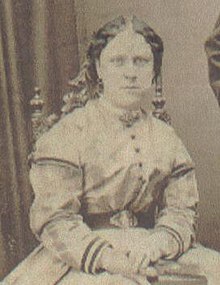Annie Chapman
| Annie Chapman | |
|---|---|

Chapman in 1869
|
|
| Born | c. 1841 London |
| Died | 8 September 1888 (aged 47) |
| Body discovered | 29 Hanbury Street in Whitechapel, London 51°31′13.35″N 0°4′21.20″W / 51.5203750°N 0.0725556°W |
| Occupation | Flower seller, crocheter, casual prostitute |
| Spouse(s) | John Chapman |
| Children | Emily Ruth Chapman Annie Georgina Chapman John Alfred Chapman |
| Parent(s) | George Smith Ruth Chapman |
Annie Chapman (born Eliza Ann Smith, c. 1841 – 8 September 1888), was a victim of the notorious unidentified serial killer Jack the Ripper, who killed and mutilated several women in the Whitechapel area of London from late August to early November 1888.
Annie Chapman was born Eliza Ann Smith. She was the daughter of George Smith of the 2nd Regiment Life Guards and Ruth Chapman. Her parents married after her birth, on 22 February 1842, in Paddington. Smith was a soldier at the time of his marriage, later becoming a domestic servant.
On 1 May 1869, Annie married her maternal relative John Chapman, a coachman, at All Saints Church in the Knightsbridge district of London. For some years the couple lived at addresses in West London, and they had three children:
In 1881 the family moved to Windsor, Berkshire, where John Chapman took a job as coachman to a farm bailiff. But young John had been born disabled, while their firstborn, Emily Ruth, died of meningitis shortly after at the age of 12. Following this, both Chapman and her husband took to heavy drinking and separated in 1884.
By the time of her death, young John was said to be in the care of a charitable school and the surviving daughter Annie Georgina, then an adolescent, was travelling with a circus in the French Third Republic.
Annie Chapman eventually moved to Whitechapel, where in 1886 she was living with a man who made wire sieves; because of this she was often known as Annie "Sievey" or "Siffey". After she and her husband separated, she had received an allowance of 10 shillings a week from him, but at the end of 1886 the payments stopped abruptly. On inquiring why they had stopped, she found her husband had died of alcohol-related causes. The sieve-maker left her soon after, possibly due to the cessation of her income. One of her friends later testified that Chapman became very depressed after this and seemed to give up on life. Her friends called her "Dark Annie", for her dark brown hair.
By 1888 Chapman was living in common lodging houses in Whitechapel, occasionally in the company of Edward "the Pensioner" Stanley, a bricklayer's labourer. She earned some income from crochet work, making antimacassars and selling flowers, supplemented by casual prostitution. An acquaintance described her as "very civil and industrious when sober", but noted "I have often seen her the worse for drink."
...
Wikipedia
